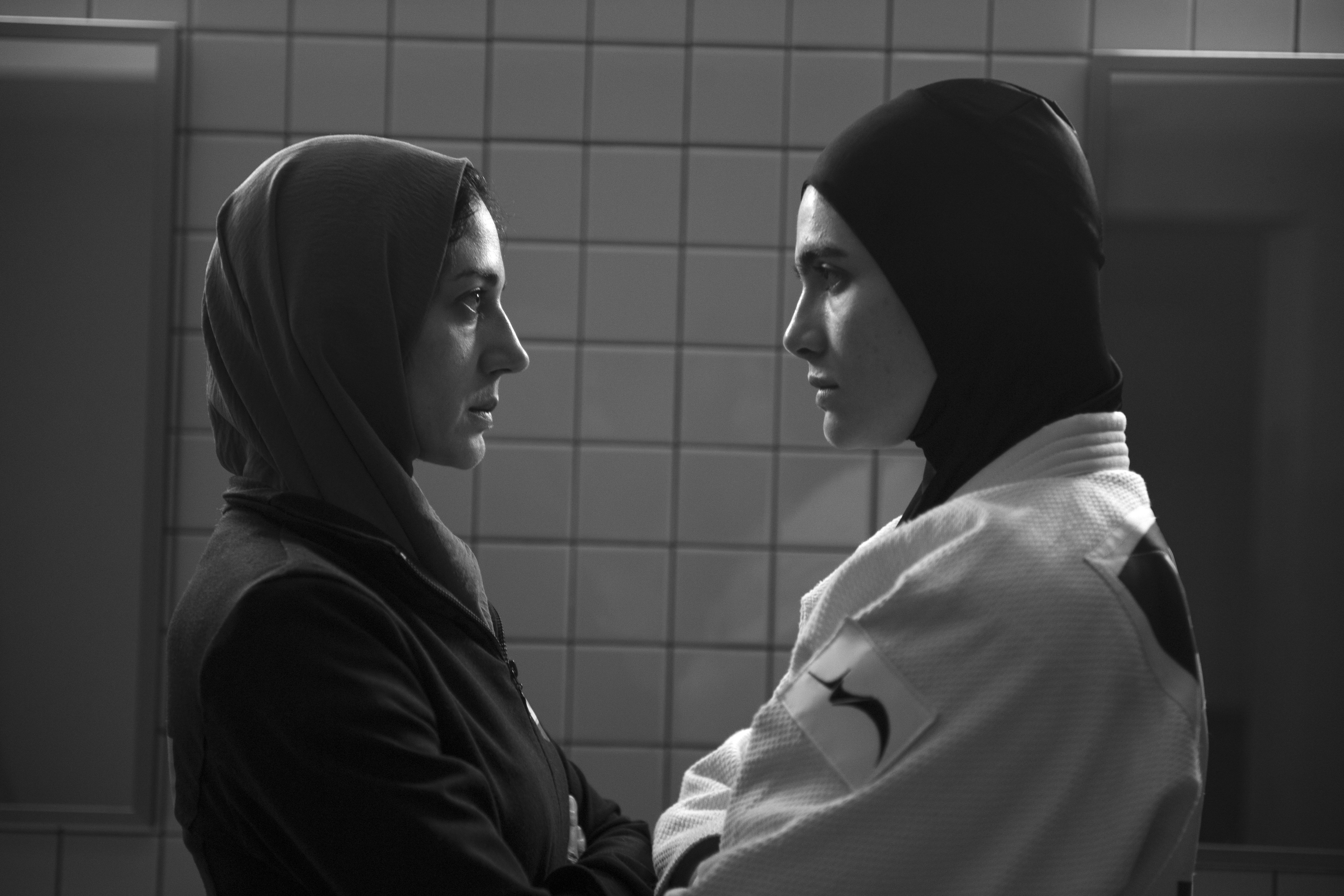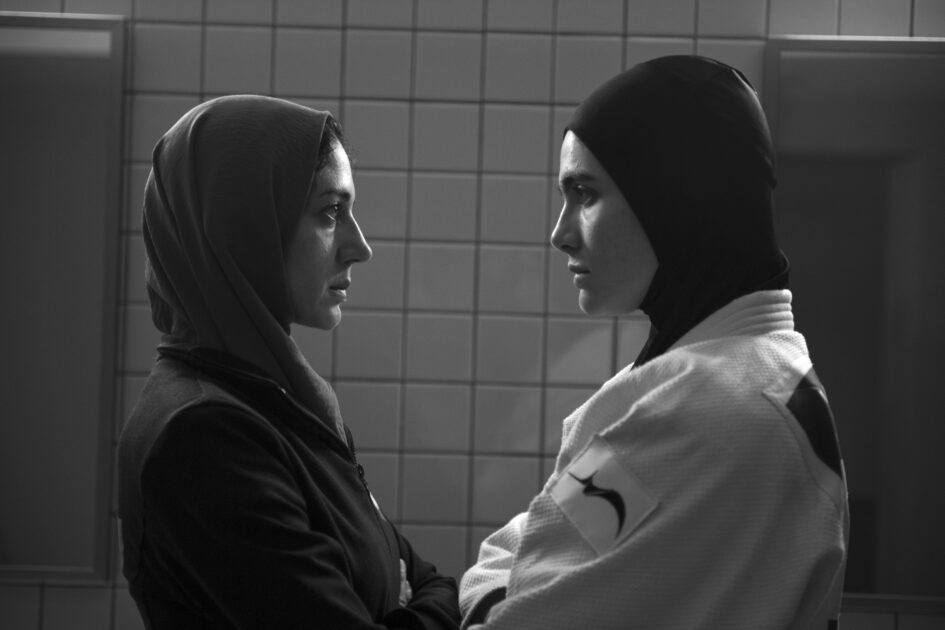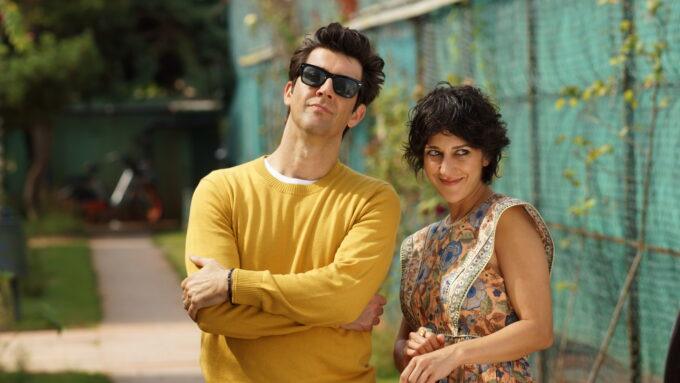






























































Zar Amir and Arienne Mandi in Tatami. Photo: Juda Khatia Psuturi.
Tatami, has made history as the first feature film to be co-directed by an Iranian and an Israeli filmmaker— a cross-cultural collaboration that is forbidden by law in Iran.
“At a time when the Iranian government still criminalizes any contact with Israelis, and state violence against women is amplified, this collaboration in itself is an extraordinary act of defiance,” states the film’s Iranian co-director and co-star, Zar Amir Ebrahimi, 44.
Her collaborator on the film, Israeli director, Guy Nattiv, 52, continues, “It’s more than a movie to us. It’s a creative statement to the world as thousands of innocent Iranian people are paying with their lives for freedom.”
The Farsi and English language film debuted at the Venice Film Festival. The film’s plot revolves around a Judo match, a sport that both Israel and Iran share a passion for. Second to soccer, Judo is reportedly the most popular sport in the two nations.
The directors chose to shoot in black and white, and with the images framed in a box format to represent “oppression.” The look is also an homage to Martin Scorsese’s Raging Bull which was the first film that “influenced” Nattiv as a child.
Tatami is almost completely set in one indoor location— a sports arena— and mostly takes place over a single day. Both elements add to the sense of “claustrophobia.” The story was initially inspired by the life of boxer, Sadaf Khadem, who in 2019 refused to return to Iran from France after having not worn a hijab during her appearance as the first Iranian female boxer to compete internationally.
Zar Amir and Nattiv shot undercover in, Tbilisi, the capital of eastern European nation, Georgia. The filmmakers used a false working title to keep the project’s content and themes top secret.
The actual title, Tatami, comes from the name of the straw mat that judo is practiced on. The directors chose the name due to a central tenant of Judo being that “the mat is where destiny is decided.”
“This film is all about destiny and hope,” they emphasize.

Co-directors of Tatami Guy Nattiv and Zar Amir outdoors at Venice Film Festival. Photo: Marilena Umuhoza Delli.
The film is almost entirely driven by the two female actors, Zar Amir and American-born, Arienne Mandi, 31, who has Iranian and Chilean origins, speaks fluent Farsi, and is best known for her work in the series, The L Word: Generation Q. On screen, the few men that have speaking parts play small supporting roles only.
Mandi portrays the main character, Leila, who is pressured by Iranian authorities and her Judo coach, Maryam (Zar Amir) to throw the World Cup match so that she can avoid contact with an Israeli competitor. In preparation for the role, Mandi trained with a Judoka for four months. During the film, every one of her onscreen opponents was played by actual Judo champions. The directors note how consistently those professionals remarked that they couldn’t believe Mandi wasn’t an expert also due to her athletic prowess. Mandi was injured during the filming of these visceral battle sequences and consequently was forced to perform with physical pain throughout the twenty-four day shoot.
The soundtrack Mandi’s character uses onscreen to pump herself up her before matches was provided by 33-year-old Persian rapper, Justina, who has lived in exile since 2018. She fled Iran for Sweden after being arrested for three-days due to a ban on female solo vocalists. Her lyrics often address human rights and discrimination against women and sexual minorities, such as in her incendiary song “F**k U Arbab” (a direct address to “masters” and tribal leaders in the Middle East).
After first being cast herself, Zar Amir was then hired as casting director for the movie. Her rapport with actors proved so strong that she was soon invited to co-direct. Nattiv states that Zar Amir is his “muse.” Zar Amir recalls how she improvised a central monologue in the film and then fought to keep it in the final cut.
Amir relates that, “As an Iranian woman who has experienced the suffocation of life in Iran and has a deep understanding of its problems, I wanted to bring to light the challenges faced by women in Iran. So many of us have been forced to leave our homes and loved ones in search of freedom and peace. Despite being separated by distance, this film reminds us that there is power in unity and resistance.”
For the film’s editing, Zar Amir arrived discreetly in Tel Aviv by using her French passport. At the start of the project, she’d vowed she would “never” travel to Israel, but once there she “felt at home.” She was struck by how much Iranian and Israeli cities, and the people were “alike,” and found that, “even Hebrew has something close to the Persian language.”
Zar Amir had been a successful television actress in Iran, but was forced to flee Iran for France in 2008 after being banned from Iranian television and film for ten years due to a “sex tape” scandal. She has been exiled in France since. After teaching herself French, she became a citizen of France in 2017. She won the 2022 Cannes Film Festival’s Best Actress award for the Farsi language thriller, Holy Spider. She also starred in the Cate Blanchett produced film, Shayda, which won the World Cinema Audience Award at the Sundance Film Festival.
Zar Amir’s co-director, Nattiv, won an Oscar for Best Short Film in 2018 with, Skin. He is also the director of the recent picture, Golda, which has faced its own controversy due to the casting of Helen Mirren as Israeli political icon, Golda Meir, despite Mirren possessing no Jewish heritage.
Without a car chase or shootout in sight, Tatami constructs a taut thriller that ratchets up the tension as the Judo World Cup tournament unfolds. It received a seven-minute standing ovation at the conclusion of its Venice Film Festival world premiere. Zar Amir’s performance stunningly finds the heart in a flawed character.
Founded in 1932, Venice Film Festival is the oldest film festival in the world. Immediately following the Tatami screening, for only the second time in the festival’s history they hosted an official political protest. Oscar-winning directors like Damien Chazelle (La La Land) and Jane Campion (The Piano, The Power of the Dog) joined Zar Amir and others on the red carpet to help demand freedom for Iranian artists and to stop the prosecution of females in Iran. Banners read “Women, Life, Freedom.” The threat to Iranian artists is real with such major film directors as Jafar Panahi (Offside, The Circle), Mohammad Rasoulof, and Mostafa Aleahmad, having been banned and jailed as recently as this year.
Tatami’s co-directors say that they are aware of a “minimum” of twenty-eight cases of Iranian athletes— both male and female in various sports— being pressured by the Iranian government. They cited the case of weightlifter, Mostafa Rajaee, who just two days prior to Tatami’s premiere was given a lifetime ban for shaking an Israeli opponent’s hand. In 2021, the International Judo Federation itself issued Iran a four-year ban for pressuring a fighter not to face an Israeli.
But like the lead character in her film, Zar Amir refuses to tap out.
“I’m sure that some people will criticize an Iranian and an Israeli working together. But cinema has allowed me to connect with the world. Prior to winning the award at Cannes a few years back I was desperate and considering giving up entirely on acting and film, and instead planned to just go live quietly in a rural town. My family at home in Iran and I have taken great risks, but if we don’t, nothing will ever change.”
Tatami was released in America this June.
The post How an “illegal” Iranian-Israeli Collaboration Resulted in One of the Strongest Films in Recent Years appeared first on CounterPunch.org.
This post was originally published on CounterPunch.org.